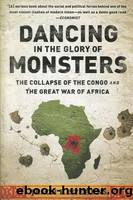Dancing in the Glory of Monsters: The Collapse of the Congo and the Great War of Africa by Jason K. Stearns

Author:Jason K. Stearns [Stearns, Jason K.]
Language: eng
Format: mobi
Tags: History
ISBN: 9781610391078
Publisher: PublicAffairs
Published: 2012-03-27T00:00:00+00:00
At Malik Kijege’s makeshift headquarters at the Tshatshi military camp, he began receiving distress calls from Tutsis hiding in Kinshasa. According to the reports he received, Kinshasa was quickly succumbing to the throes of anti-Tutsi frenzy. Once again, leaders had resorted to ethnic diatribe to rally the population behind them.
Kabila addressed a march in downtown Kinshasa, where he whipped up the crowd against the Tutsi invaders. The demonstration was full of histrionics. “They want to create a Tutsi empire,” the president announced, dressed in military fatigues. His information minister, Didier Mumengi, also dressed in a green uniform, told the crowd that the Tutsi rebels had “embarked on the extermination of the Congolese people of Bukavu.” Tshala Mwana, a famous singer and allegedly the president’s mistress, led the parade dressed in white, tugging two goats on a leash with signs identifying them as Deo Bugera and Bizima Karaha, the two most famous Tutsi in Kabila’s government who had defected to join the rebellion. Some of the marchers brandished signs:“We will make Rwanda the twelfth province of the Congo,” and “No to Tutsi expansion in the DRC and Africa.” As the cheering crowd looked on, the famous, brawny wrestler Edingwe—he could often be seen jogging and singing with his followers along the Kinshasa streets at dawn—stepped up and slit the animals’ throats.23
Kabila promised that he would distribute guns to the population so that it could defend itself against the aggressors. Soon, thousands of youths, including many street children and delinquents, were streaming into recruitment centers in Kinshasa. Every day, several hundred young men filed into the Martyrs’ Stadium, learned how to use a gun, and sang songs. One of the standards was:“You Rwandans, God has not chosen you. If you want dialogue, we’ll have dialogue. If you want war, we’ll have war.”
The line between the Rwandan government and the Tutsi people as a whole was quickly blurring. Demagogues in Kinshasa bore a heavy responsibility in whipping up ethnic animosities in the capital. But they didn’t have to work too hard. Rwandan troops had humiliated and angered residents in the capital during their year-long stay. Kinois—as the inhabitants of the capital were known—had been working for years against Mobutu’s dictatorship. They had marched in the tens of thousands and had seen their brothers and sisters tortured and killed, only to see their victory snatched away by a bunch of foreigners. As Kinois often quip: “We put Mobutu in the ambulance. All Kabila did was drive the corpse to the cemetery.” Then the new rulers, who didn’t speak their language and didn’t look like them, began beating them and telling the women they dressed like prostitutes. They felt emasculated and abandoned to hunger and poverty.
Kabila gave orders for soldiers to shoot any Tutsi found with a weapon. Among the people, there was little distinction between a Tutsi civilian and a Tutsi soldier. “When the fighting starts, they all pull guns out from under their beds,” Congolese would often tell me. “The Tutsi in school with me yesterday are in the streets today in uniform.
Download
This site does not store any files on its server. We only index and link to content provided by other sites. Please contact the content providers to delete copyright contents if any and email us, we'll remove relevant links or contents immediately.
| Africa | Americas |
| Arctic & Antarctica | Asia |
| Australia & Oceania | Europe |
| Middle East | Russia |
| United States | World |
| Ancient Civilizations | Military |
| Historical Study & Educational Resources |
Goodbye Paradise(2963)
Men at Arms by Terry Pratchett(2404)
Tobruk by Peter Fitzsimons(2060)
Pirate Alley by Terry McKnight(1908)
Arabs by Eugene Rogan(1836)
Borders by unknow(1785)
Belonging by Unknown(1465)
The Biafra Story by Frederick Forsyth(1321)
It's Our Turn to Eat by Michela Wrong(1301)
Botswana--Culture Smart! by Michael Main(1237)
A Winter in Arabia by Freya Stark(1223)
Gandhi by Ramachandra Guha(1196)
Coffee: From Bean to Barista by Robert W. Thurston(1180)
Livingstone by Tim Jeal(1151)
The Falls by Unknown(1141)
The Source by James A. Michener(1134)
The Shield and The Sword by Ernle Bradford(1101)
Egyptian Mythology A Fascinating Guide to Understanding the Gods, Goddesses, Monsters, and Mortals (Greek Mythology - Norse Mythology - Egyptian Mythology) by Matt Clayton(1087)
Africa: Altered States, Ordinary Miracles by Richard Dowden(1078)
